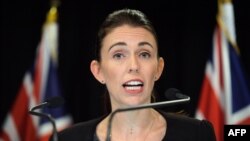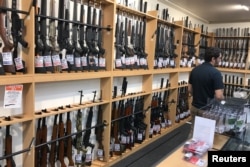Nearly one week after 50 Muslim worshippers in Christchurch, New Zealand were gunned down, Prime Minister Jacinda Ardern imposed an immediate ban on all military-style semi-automatic and automatic assault rifles.
The ban, which Prime Minister Ardern announced Thursday in Wellington, includes high-capacity magazines, which can hold multiple rounds of ammunition, and accessories that can convert ordinary rifles into fast-acting assault rifles. Ardern said she imposed the sales ban to prevent stockpiling and that a complete ban on the weapons would be implemented after new laws take effect.
Ardern also announced a large-scale buyback scheme to encourage owners of such weapons to surrender them to authorities. She said the government could spend up to $140 million to buy back guns from owners who turn them in. The military and police would be exempt, as would pest control businesess. New Zealand police said on their website a "transitional period" would allow people to turn in their guns without penalty.
Parliament is expected to approve the proposed laws when it reconvenes in mid-April.
New Zealand, with a population of 5 million people, has nearly 250,000 licensed gun owners, the government said. It estimates there are some 1.5 million guns in the country.
The ban has wide support in New Zealand. The head of the opposition National Party, Simon Bridges, said, "We agree that the public doesn't need access to military-style semi-automatic weapons."
University of Otago professor and gun expert Kevin Clements said the ban puts the country "almost in line with Australia, Britain and "somewhat with Canada."
One of the country's largest gun retailers, Hunting & Fishing New Zealand, said it favors "any government measure to permanently ban such weapons." The company said it would stop selling assault-style weapons and halt online firearms sales.
University of Waikato international law professor Alexander Gillespie said Ardern's ban is "the kind of move that can only be done in a common-law country where guns are not a right. Guns are a real privilege," he said. "If there was a legal right like there is in the United States, this would be much more difficult."
Almost half of the nearly 860 million civilian-owned guns throughout the world are owned by Americans, according to the global Small Arms Survey, which was conducted by the Graduate Institute of International and Development Studies in Geneva.
Authorities have charged 28-year-old Australian Brenton Harrison Tarrant with murder in connection with the March 15 attacks on the al-Noor and Linwood mosques. The self-proclaimed white nationalist did not enter a plea in his initial court appearance the day after the attack. His next court appearance is April 5.
Meanwhile, burials were held Thursday for more of the 50 victims killed in the twin attacks. Police say all the victims have now been formally identified, with more than 20 bodies released for burial. The long wait has added an extra element of anguish to the grieving families, as Islamic custom calls for bodies to be cleaned and buried as soon as possible after death, ideally within 24 hours.
Thousands of worshippers are expected to be in attendance as the al-Noor mosque is set to reopen for Friday's call to prayers.

